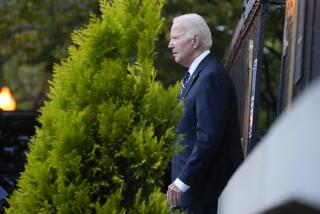CIA’s Gates Briefed on Contras, Official Says : Intelligence: But the source emphasizes the 1986 sessions focused on ‘authorized, legal activities,’ not covert aid.
- Share via
WASHINGTON — CIA director-designate Robert M. Gates received regular briefings in 1986 on resuming legal aid to the Contras from a CIA subordinate who recently admitted taking part in covering up illegal efforts to support the Nicaraguan rebels, a former agency official said Friday.
But, the former official said, the briefings “focused on authorized, legal activities,” not on efforts to deliver lethal aid to the Contras before Congress lifted its ban on such assistance.
The ex-official acknowledged that he was not present when the briefings were conducted but said he learned of the sessions by other means, which he declined to describe.
The briefings were first reported Friday by the New York Times.
A White House spokesman said Friday that President Bush has full faith in Gates’ integrity.
An Administration official acknowledged that Gates had a series of briefings by Alan D. Fiers Jr., former chief of the CIA’s Central American Task Force, but said that the sessions dealt only with plans for providing $100 million in military and humanitarian aid approved by Congress in June, 1986.
“After Congress voted $100 million in aid for the Contras, Gates put Fiers on his schedule for regular briefings on what the agency was going to do” when the ban on such aid was officially lifted, the ex-CIA official said. He said there were “in the ballpark” of six briefings, and that they began in the mid-to-late summer of 1986.
Gates as deputy CIA director was to coordinate the resumed aid with the Defense and State departments.
Fiers’ briefings could intensify questions of what Gates knew about illicit aid to the Contras, when he knew it and what he did about it.
Fiers pleaded guilty last week to withholding information from Congress, including that he had learned from former National Security Council aide Oliver L. North in the summer of 1986 that profits from secret arms sales to Iran were being diverted to the Contras.
Despite the insistence of the Administration official and the ex-CIA official that Fiers’ briefings did not get into North’s activities, members of the Senate Intelligence Committee, which has postponed Gates’ confirmation hearing until Sept. 16, said that they want to look into the matter.
Sen. Alan Cranston (D-Calif.), a member of the panel, said that he had not known of the Fiers-Gates briefings and did not think others on the committee had been aware of them either.
“We don’t know yet what he (Fiers) was briefing Gates about,” Cranston said. “But it certainly opens up another area for questions.”
The ex-CIA official said it was “credible” that Fiers in briefing Gates did not mention how the legally authorized aid would “dovetail” with the illegal assistance. Even if Fiers had mentioned supplies sent before the ban was lifted, “he would have referred to them as part of the private effort to help the Contras and not any diversion,” the ex-official said.
“You don’t appreciate the degree of compartmentalization (of information) at the agency,” he said.
The ex-official added that this was compounded by the fact that Gates came from the analytical branch of CIA activities, while Fiers, his boss Clair E. George and the CIA’s late director William J. Casey were all from the operational side.
Fiers, in pleading guilty, admitted relaying word of the diversion to George, who he said reacted by telling Fiers that he was only one of a handful of people who knew.
Adding to the support of Gates’ claim that he knew little of the diversion, the ex-official said, was that Casey “cared passionately about Central America,” while Gates’ interests were more in such areas as Afghanistan and Angola, “where there really was head-to-head confrontation with the Soviets.”
The contact with Fiers about Contra aid could complicate Gates’ job of convincing senators that he had only limited information about any diversion, even though Casey--one rank above him--and George--one rank below--did know, according to Fiers’ and other testimony.
Cranston said that it could have been so.
“The compartmentalization process in the CIA was so severe that while it sounds weird that the No. 1 guy and the No. 3 guy could have known while the No. 2 did not, it’s not at all impossible,” he said.
Staff writer Michael Ross contributed to this story.
More to Read
Sign up for Essential California
The most important California stories and recommendations in your inbox every morning.
You may occasionally receive promotional content from the Los Angeles Times.










